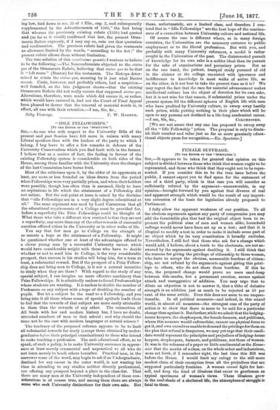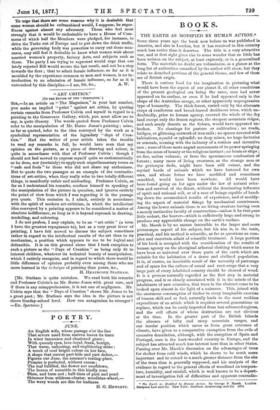FEMALE SUFFRAGE.
[TO THE EDITOR OF THE"SPECTATOR.']
SIR,—It appears to be taken for granted that opinion on this subject is divided between those who think that women ought to be represented, and those who think that they ought not to be repre- sented. If you consider this to be the true issue before the- public, I cannot expect you to find space for the statement of one of a third party, which in that case you will consider as- sufficiently refuted by the argument—unanswerable, in my opinion—brought forward by you against that divorce of real and apparent strength which would be the result of any import. tan extension of the basis for legislation already proposed to- Parliament.
I fully allow the apparent weakness of our position. To all the obvious arguments against any party of compromise you may add the formidable plea that had the original object been to re- present the political aims of men and women alike, household suffrage would never have been set up as a test ; and that it is- illogical to modify a test in order to make it include some part of an object which by its very constitution it broadly excludes. Nevertheless, I still feel that those who ask for a change which would add, I believe, about a tenth to the electorate, are not an- swered by the arguments against doubling it. I still think that the reasons for giving the privilege of citizenship to those women, who have to accept the obvious, measurable burdens of citizen- ship, are not refuted by the arguments against giving this privi- lege to others, who do not share those burdens. If this be true, the proposed change would prove no mere sand-heap between tide-marks, but a permanent erection, secure against attack and umuggestive of addition. You may urge that to dilute an objection is not to answer it, that a tithe of delusive strength is an addition just as much to be rejected as 50 per cent. of the same article. Even this does not seem to me unques- tionable. In all political measures—and indeed, in this mixed world, in almost all measures—the strongest case of the party of action is to show that there is more to be said for a particular change than against it. Butfurther, while we admit that the lodging. house keepers, the shopkeepers, the female farmers, and publicans, whom this measure would enfranchise, cannot use physical force to get it, and own ourselves nnableto demand the privilege for them on the plea that refusal is dangerous, we may yet urge that their candi- date would represent the principles and prejudices of lodging-house keepers, shopkeepers, farmers, and publicans, not those of women. It was in the columns of a paper so little sentimental as the Econo- mist that the merits of a class, on the whole sober and industrious, were set forth, if I remember right, the last time this Bill was before the House. I would limit my eulogy to the still more modest claim of their exemption from all the prejudices that are supposed particularly feminine. A woman cannot fight for her- self, and keep the kind of illusions that occur to gentlemen as typical specimens of woman's views. These illusions grow in the cool shade of a sheltered life, the atmosphere of struggle is fatal to them.
To urge that there are some reasons why it is desirable that some women should be enfranchised would, I suppose, be super- fluous against almost any adversary. Those who feel most -strongly that it would be undesirable to have a House of Com- mons of which half the Members were pledged, for instance, to drive the Turks out of Europe and to put down the drink traffic, while the governing body was powerless to carry out these mea- sures, may still feel it desirable to know what women wish about married women's property, factory Acts, and subjects such as these. The party I am trying to represent would urge that our lately rejected Bill would secure the last result, and not be a step towards the first ; that to admit female influence, so far as it is moulded by the experience common to men and women, is no in- troduction to an admission of female influence, so far as it is untouched by this discipline.—I am, Sir, &c., A. W.



































 Previous page
Previous page